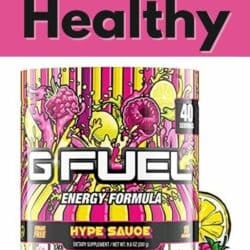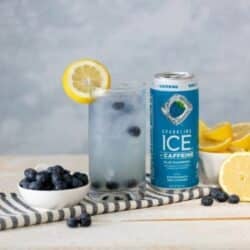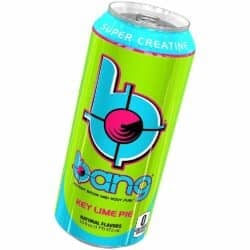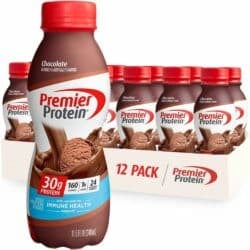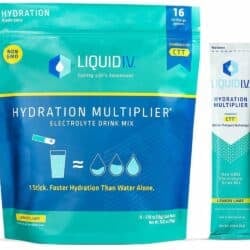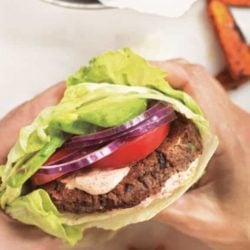Is G Fuel Healthy (From a Nutritionist)?
In this blog post, we’ll review the question of whether or not G Fuel sports drinks are good for you or not? Find out what this product’s nutrition pros and cons are and what potential better alternatives there are. For most people, G Fuel is not considered to be good for you.
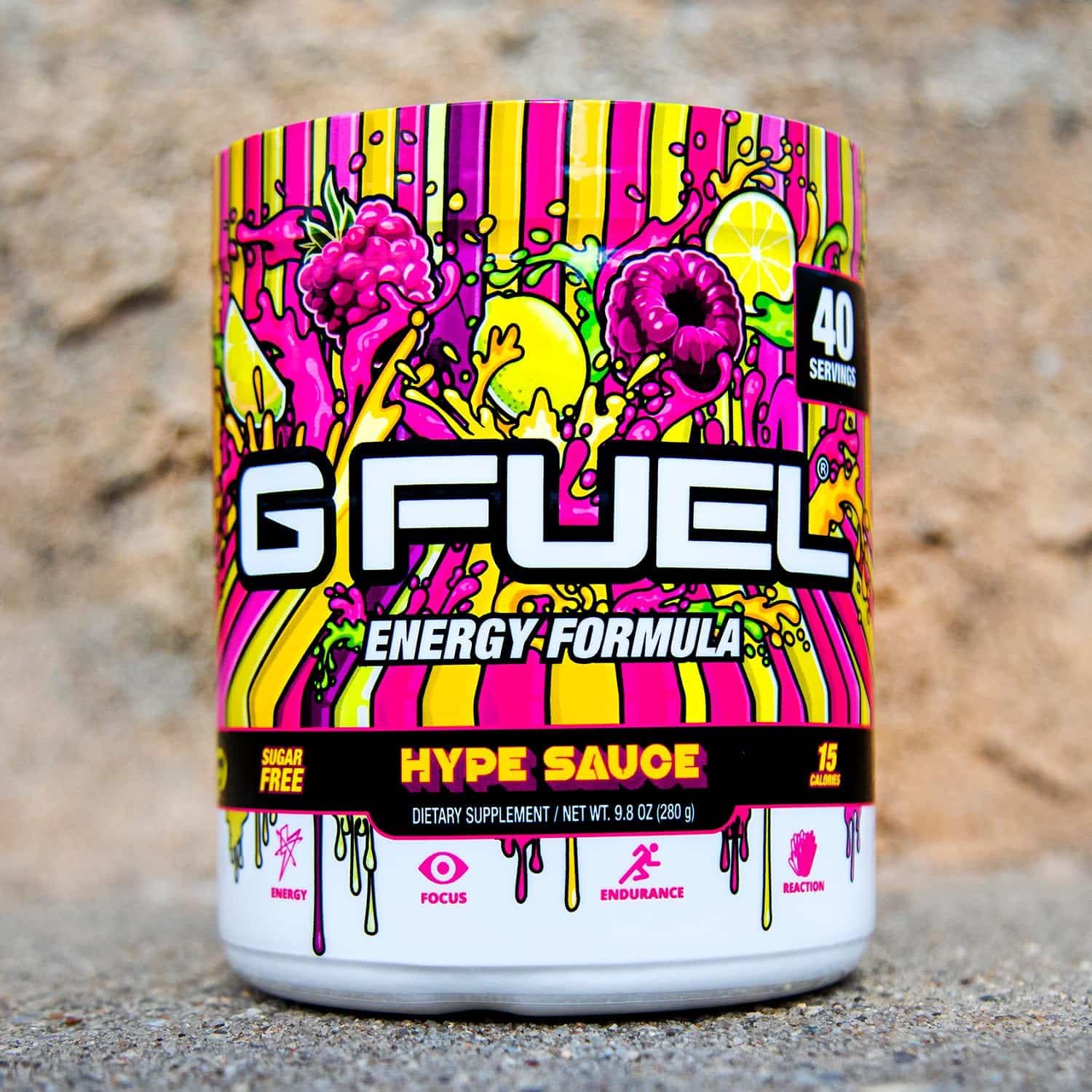
G Fuel Energy Fuel Facts
G Fuel is an energy formula initially created to keep online gamers “focused and energized.”
Gamma Labs launched the G Fuel product range in 2012 with three flavors, Blue Ice, Fruit Punch, and Lemon Lime. It became a popular drink in the eSports and online gaming industry.
These days, there are different types of G Fuel available in over 40 different flavors. Not only gamers use this product. Gamma Labs market it as a drink for people like UFC fighters, bodybuilders, fitness models, NFL players, and YouTube stars.
The types of G Fuel in a variety of flavors include:
- G Fuel Energy Formula
- G Fuel Energy Cans
- G Fuel Hydration Formula
- G Fuel Sparkling Hydration Formula
The company aims to create sugar-free energy products fortified with antioxidants and vitamins to fuel focus, energy, reaction time, and endurance.
One of its competitors is Red Bull which is another energy drink.
Main Ingredients
Each serving of the G Fuel Energy Formula contains 140 mg of caffeine, antioxidants, amino acids, vitamins C, E, B6, and B12, and energy and focus-enhancing formulas.
The G Fuel Energy drink cans contain 300 mg of caffeine, zero sugar, and zero calories.
The G Fuel Hydration Formula and Sparkling Hydration bottles are free from caffeine and sugar and contain amino acids, vitamins, and electrolytes.
The ingredient list for the G Fuel Energy Formula in the Hype Sauce flavor includes:
- Maltodextrin
- Citric Acid
- Silicon Dioxide
- Natural and Artificial Flavors
- Acesulfame Potassium
- Sucralose
- FD&C Red #40
- Taurine
- L-Citrulline Malate
- Caffeine Anhydrous
- Glucuronolactone
- N-Acetyl-L-Carnitine HCl
- L-Tyrosine
- N-Acetyl-L-Tyrosine
- Adenosine-5′-Triphosphate Disodium Salt (ATP)
- Toothed Clubmoss (Huperzia serrata) Aerial Parts Extract (standardized to 1% Huperzine A)
- Pineapple Fruit Powder
- Cabbage Palm Berry Powder
- Apple Fruit Powder
- Orange Fruit Powder
- Blueberry Fruit Powder
- Grape Seed Powder
- Grapefruit Fruit Powder
- Plum Fruit Powder
- Raspberry Fruit Powder
- Strawberry Fruit Powder
- Watermelon Fruit Powder
- Lemon Fruit Powder
- Lime Fruit Powder
- Melon Fruit Powder
- Papaya Fruit Powder
- Peach Fruit Powder
- Pear Fruit Powder
- Acerola Berry Powder
- Pomegranate Fruit Extract
- Vitamin C (Ascorbic Acid)
- Vitamin E (as D-Alpha Tocopheryl Acetate)
- Vitamin B6 (as Pyridoxine HCl)
- Vitamin B12 (as Methylcobalamin)
Here is some more detailed information for some of the major ingredients found in G Fuel products is you can decide is G Fuel is bad or okay for you.
Caffeine
Caffeine is stimulant derived from coffee beans, tea leaves, and cacao plants.
Research has linked moderate caffeine consumption to a reduced risk of liver cancer, among many other potential health benefits.
But, it’s important to remember that caffeine is a stimulant, and you should exercise caution when consuming it regularly. Too much caffeine can negatively affect heart rate.
Most healthy adults can safely consume up to about 400 mg of caffeine per day. One serving of G Fuel have about 150 to 300 mg per serving which is considered to have a high caffeine content and potentially negative side effects (see my related list of highest caffeine drinks at Starbucks).
According to the American Academy of Pediatrics, children should not have caffeine. Most of the G Fuel products contain caffeine which can increase energy levels temporarily.
Sucralose
Sucralose is a synthetic sweetener made from sucrose. The body can’t metabolize it, and it is chlorinated.
Research shows that long-term use may have a toxic effect on the body and can change your gut microbiome by lowering good bacteria. Sucralose consumption can also increase inflammation, leading to problems like diabetes and obesity.
Sucralose is not considered a healthy ingredient and should be used cautiously or avoided altogether due to its potential to lead to health problems (although the Food & Drug Administration has not banned it).
Sucralose is also known as Splenda and is one of the artificial sweeteners that you may wish to avoid. This ingredient is also featured in my analysis of why Powerade One is bad for you.
Silicon Dioxide
Silicon Dioxide is a common food additive made from silica and oxygen, two naturally occurring elements. It is present in plants like leafy greens, bell peppers, brown rice, beets, and oats.
In processed food and supplement production, silicon dioxide is an anti-caking agent, disintegrant, and absorbent.
Research has not conclusively proven that silicon dioxide harms human health, but there are also no significant health benefits.
Taurine
Taurine is a conditional amino acid naturally present in the body and is found in eggs, meat, and fish. It can help support muscle maintenance and heart health.
If your diet includes animal products, you could already be getting additional taurine through your food.
Nutrition Pros
G Fuel does not contain any added sugars, and it’s gluten-free.
G Fuel Hydration Formula and Sparkling Hydration contain electrolytes and fewer processed ingredients than the other products.
Nutrition Cons
Besides the G Fuel Hydration Formula, all other G Fuel products contain caffeine and artificial food dyes, including FD&C Yellow #6 and FD&C Red #40.
All G Fuel products contain artificial flavors and sweeteners like sucralose, which has several potential health risks.
There’s also a California Proposition 65 lead warning for this brand. Gamma Labs explains that the warning is because of trace amounts of lead because of some ingredients being grown in soil and that California has far more stringent laws than the FDA. It’s up to you to decide how you feel about these warnings.
The bottom line is that this product contains too many artificial and troublesome ingredients to be consider part of a healthy lifestyle. Better alternatives include real food ingredients with natural ingredients such as coffee or tea.
That said, it’s a good idea to avoid sugar-loaded energy drinks as well.
If you need more energy and focus, you may wish to try supplements that have a vitamin B energy complex or ruling out other health issues. Speak to your healthcare provider if you are concerned about feelings of low energy or if you need a dietary supplement.
FAQs
G Fuel is a highly processed product with some potentially unhealthy ingredients. For optimal health, it’s best to consume real whole foods and not processed ingredients. In my opinion, G Fuel is not a health-promoting product to consume and may have negative health effects on some people.
G Fuel is not a drug, it is a supplement, so it doesn’t require approval by the FDA. It is manufactured in FDA-certified facilities that are inspected and FDA-compliant.
Although it can boost your energy, G Fuel is not a pre-workout. Gamma Labs doesn’t market it as such but claims that athletes use it.
The company created G Fuel with the eSports and online gaming community in mind.
Not everyone should drink G Fuel. Children and people sensitive to caffeine should avoid caffeinated G Fuel products.
No, G Fuel contains no added sugar, so you won’t experience that. However, it contains sucralose, a sweetener that may have adverse effects on your health over time (see the section above on sucralose).
More Product Reviews You Might Like
Conclusions
G Fuel is a highly processed product with very few nutritional pros. It does not contain any added sugars, and it’s gluten-free. The downside is that it contains many potentially unhealthy artificial ingredients, some of which can harm people with certain health conditions.
Some G Fuel products have a high caffeine content, so they won’t be suitable for children or people sensitive to caffeine. For an energy boost or improved concentration, it’s best to consume real whole foods instead of processed products.
Don’t forget to join my newsletter list to get exclusive clean eating recipes and tips. The newsletter is 100% free with no spam; unsubscribe anytime.
About the Author: Carrie Forrest has a master’s degree in public health with a specialty in nutrition and is a certified holistic nutritionist. She is a top wellness and food blogger with over 5 million annual visitors to her site. Carrie has an incredible story of recovery from chronic illness and is passionate about helping other women transform their health. Send her a message through her contact form.
Note: this post is for informational purposes only and is not intended as medical advice. Please consult your healthcare provider for recommendations related to your individual situation.


